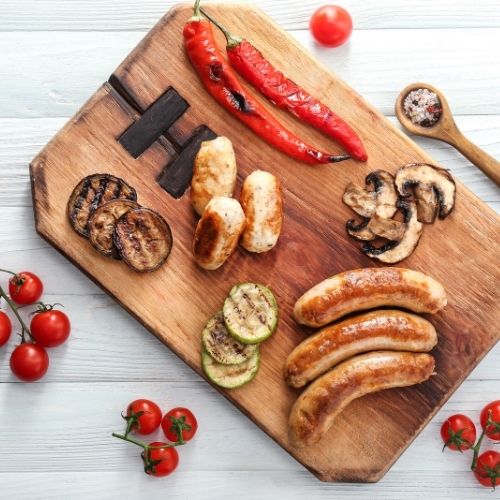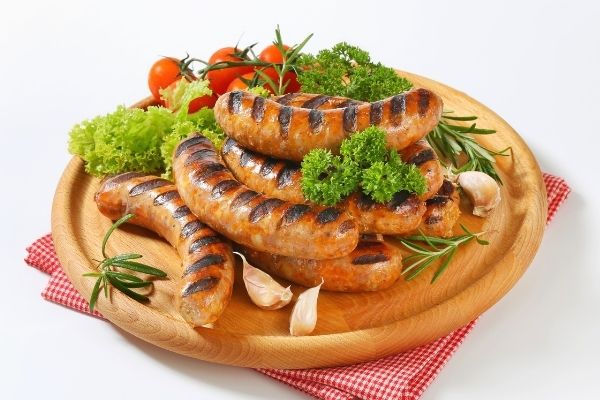It might sound like a heavyweight battle and for some sausage lovers it is, as far as weighing the pros and cons of knockwurst vs bratwurst.
It isn’t just a case of semantics and wordplay, especially in Germany.
Many German towns and regions take their sausages (and the differences and elements that make them unique) very, very seriously.
While knockwurst (technically knackwurst), bratwurst, bockwurst, and other sausages are often cooked the same way, the ingredients and serving style for each varies a good bit.
Knockwurst vs Bratwurst: the Basics

If you love a great brat, you’re almost guaranteed to be a knockwurst fan as well. And vice versa.
The ingredients and taste are different but that same basic joy of great grilled meat — plus some beer — applies equally to both knockwurst and bratwurst.
Bratwurst are probably more easily found as far as buying them locally but knockwurst are also popular.
Knockwurst is a bit lumpier and stouter than Bratwurst. The casing lengths are hence different. The spice level in Knockwurst is higher than Bratwurst.
Knockwurst is primarily of the pork and veal variety, unlike Bratwurst that has veal as its primary mean type, most of the time.
Knockwurst is smoother in texture due to being ground finely, which is not the case in Bratwurst, which has a coarser feel.
The orange-reddish tint of Knockwurst is distinguishable from the pinkish color of Bratwurst. The contrast is because of the obvious difference in meats.
Your best bet for great bratwurst and other sausages will be in the Brat Belt of the U.S. in states such as Wisconsin, Minnesota, Michigan, and Illinois.
Kewauskum, Klement’s, Carle’s, and Usinger’s are just a few of the famous sausage makers from this area.
In This Corner: Bratwurst
Hopefully you’re familiar with brats but we’ll start at the beginning, just in case.

Bratwurst is traditionally made from pork and veal, with a fairly light load of spices added. Some bratwursts are now made with a pork and beef mixture but traditionalists will argue that the only real brat is one that includes pork and veal.
Its first evidence states back to as old as 228 AD, in the Franconian city of Nuremberg. This city remains true to its roots and is now an international center for sausages, especially grilled.
Bratwurst is longer and coarser than the usual sausage types. In upper mid-western America, these are usually served with cheddar cheese and hot jalapeno peppers.
Brats are light in color and in taste, without much initial seasoning when they’re made. They’re served on hard rolls and often topped with onions and stone ground mustard.
Different brat recipes call for different seasonings — including nutmeg, mace, marjoram, and ground caraway seeds — but the spice load is generally pretty low with bratwurst.
Brats are often simmered in beer prior to (or even after) they are grilled.
Bratwurst sausages are mostly celebrated in fests.
A must-have for the audience in various outdoor games of soccer or baseball. A good first date at a great hot sausage stands in the rain. Making up by munching on these while reminiscing of old memories with your best friend after a fight. In all these scenarios, a tasty Bratwurst is what you need.
If you are a spicy eater, you do have the option of adding onion, garlic, parsley, or other herbs and spices of your liking to take it up a notch, suitable to your taste buds. A touch of white wine and vinegar does it tons good too.
And in This Corner: Knockwurst
Originally called ‘Knackwurst’ as its North German (Holstein) name, but later in North America, it came to be known as ‘Knockwurst.’ This one is a short and fat type of sausage sometimes cut into two for easy edibility. It is known for its delicious seasoning.

The North American variation is more popular than the German version.
Traditional knockwurst are smaller in size and usually made with much more beef — sometimes made entirely from beef.
It takes its name from the German terms “knacken” — to crack — and “knackig” or crisp; when cooked and eaten the sausage itself which tends to crackle and break.
The origins of this trace back to Oktoberfest of 1810. At the celebration of Prince Ludwig of Bavaria’s marriage to Princess Therese, knockwurst was served in the form of stew. Its serving as stew form got lost through the years, and now it is simply served on a stick or in a bun.
The small size makes it a perfect finger food as it’s easier to handle than larger sausages.
Knockwurst is more heavily seasoned and includes garlic, salt, and other spices.
Constitutes veal (meat of young cattle) or pork mostly. A pod or two of garlic is added for the seasonings, and then the meat is wrapped in a hog casing, which is the pig intestine casing. It is of the smoked variety and is not consumed raw but cooked.
Knockwurst in the U.S. is often more similar to bratwurst in size and shape and can be made with pork added as well.
The credit of such finger-licking goodness goes to aging it for at least five days and smoking over special oak wood. It is further cooked by either grilling or poaching (cooked perfectly outside while the inside is still a bit raw).
Other names for knockwurst include knackwurst, knackwurste, crack sausage, garlic sausage, and knoblouch.
The traditional serving of it is accompanied by sauerkraut (chopped pickled cabbage) and potato salad. Additionally, for a bit of sauciness to it, you can choose to add any of your go-to condiments like mayonnaise, ketchup, or even mustard.
There is more to the sausage world than Knockwurst and Bratwurst. However, these are the two topmost contenders in taste, visual effects, and popularity. There is always a tough competition between the two for which ones the best.
Each has its unique taste and flavor. Individual preferences are what make them apart. But, at its core, the Sausage fandom is one.
Tasty food is happy food!
